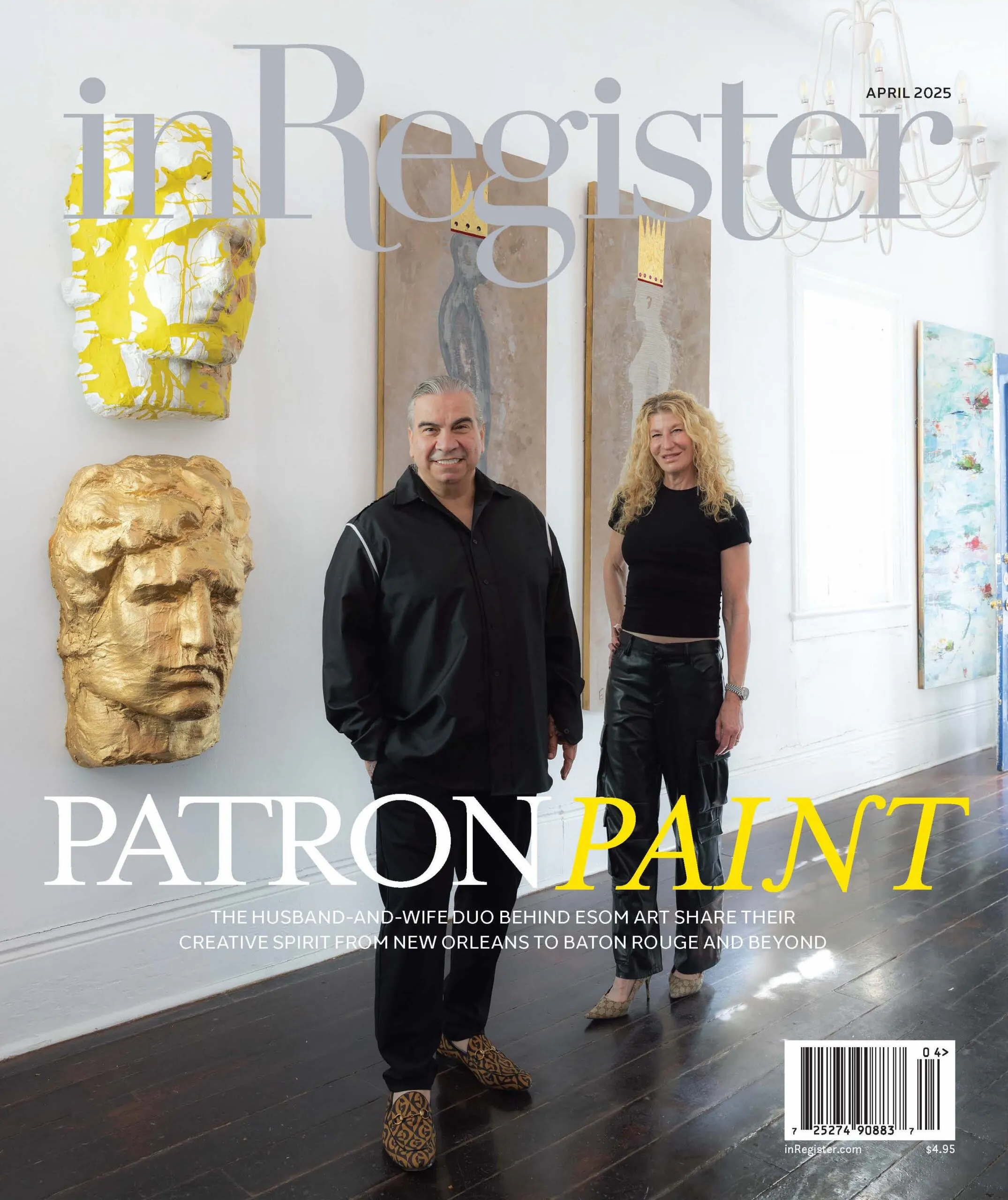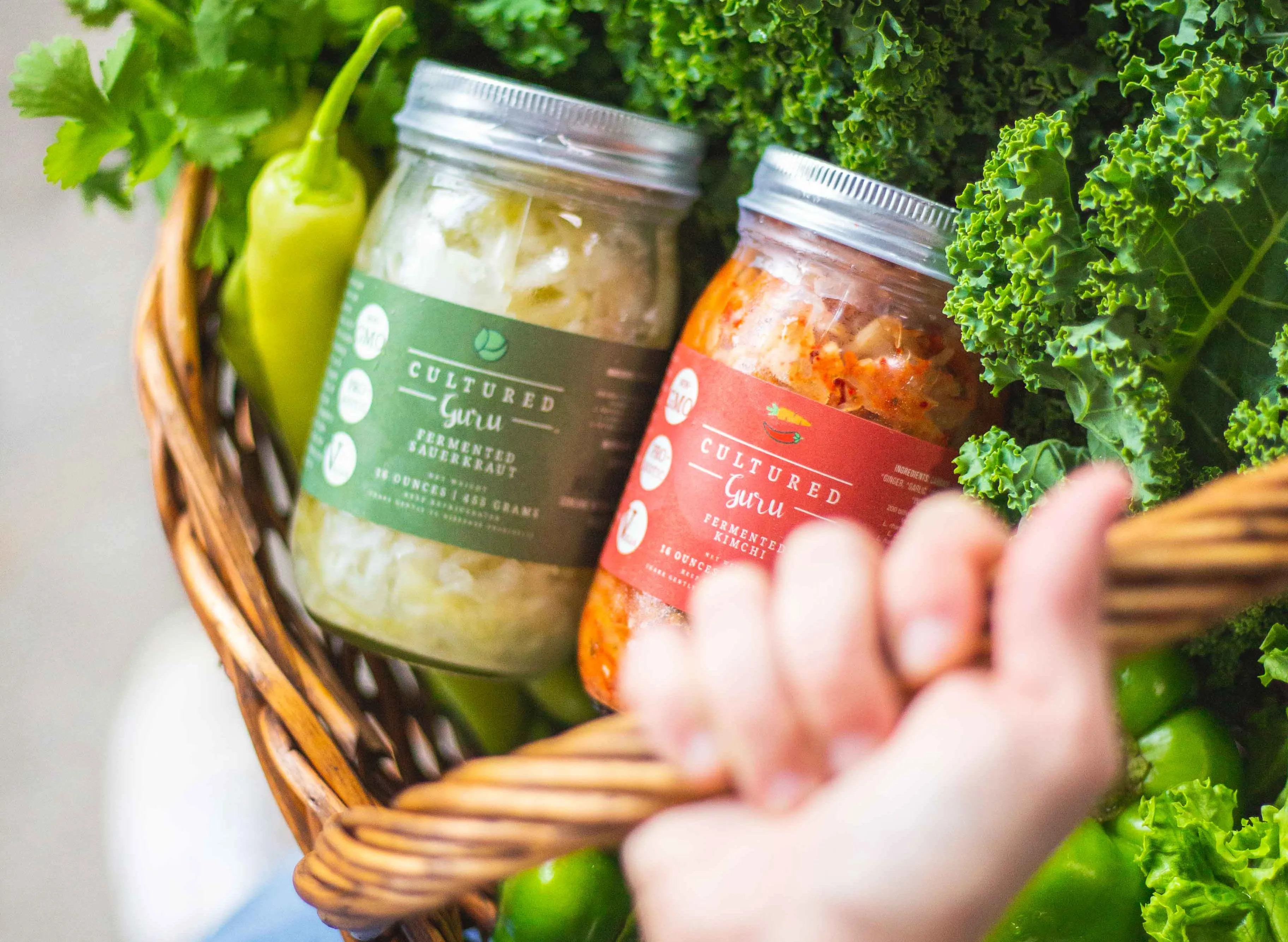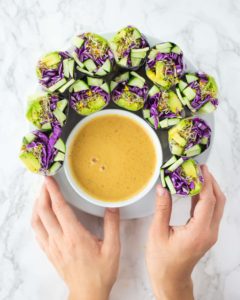10 Questions with Kaitlynn Fenley of Cultured Guru
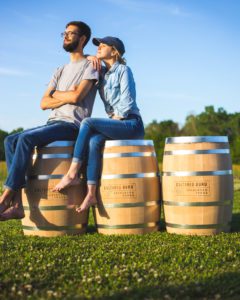
Put a microbiologist and a photographer together, and what do you get? Kaitlynn Fenley and Jon Scott Chachere never could have predicted their individual passion projects, seemingly so far from the other, could have integrated to create an entire, thriving business. Cultured Guru, the couple’s educational health and wellness brand and fermentation company, was born out of an innovative concept utilizing both of their skills. Last year inRegister learned about fermented foods and their benefits from Kaitlynn in this story. This week, we caught up to her again in hopes of getting some insight into how she and Chachere built their business together, and what goes into maintaining a fermentation company.
1. What is a typical day like for you guys?
We work about 15 hours a day. Currently, the entirety of our business is created and maintained by just Jon and me. We run the whole business, design all the pretty labels and marketing materials, take all of the beautiful photos, ship all the packages, answer all the emails, ferment all the foods, and deliver all the foods to grocery stores, amongst other things. It’s a lot. That whole “love what you do and you’ll never work a day in your life” thing is a total lie. We work more that we’ve ever worked; the only difference is that now we have purpose, and what we do truly means something to me.
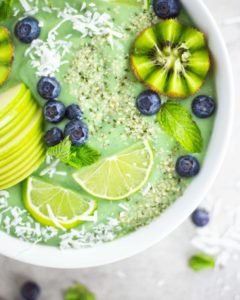 The average day begins at about 7 a.m. in our apartment. We make breakfast and usually take a photo of it to post on Instagram. Then around 8 to 9 a.m., we take our dog for a walk and talk about things we need to get done for the day. From about 9 t0 11 a.m. we answer emails and ship packages. If we have grocery-store deliveries scheduled or meetings scheduled with people, those happen first and sometimes can last a full day.
The average day begins at about 7 a.m. in our apartment. We make breakfast and usually take a photo of it to post on Instagram. Then around 8 to 9 a.m., we take our dog for a walk and talk about things we need to get done for the day. From about 9 t0 11 a.m. we answer emails and ship packages. If we have grocery-store deliveries scheduled or meetings scheduled with people, those happen first and sometimes can last a full day.
We try to go to the gym every day for an hour and that happens somewhere between 9 a.m. and noon. We have to take care of our bodies because without us there is no Cultured Guru. Around noon, we make lunch and photograph it. If what I’m making for lunch is a blog recipe, we have a process photo shoot that takes about an hour. After lunchtime photos, Jon edits them and we pick one to post on Instagram around 2 p.m.
From about 2 to 4 p.m., I do office-work-type things: inventory, ordering supplies, organizing our schedule, coordinating deliveries, paperwork-type things, etc. Between 2 and 4 p.m., Jon is usually designing something we need: Instagram stories, Pinterest pins, marketing materials, catalogs, wholesale materials. The list goes on.
From about 4 to 7 p.m. currently, we work on paperwork and ideas for our commercial kitchen space that we are renovating, answer Instagram messages and more emails, and possibly photograph our dinner too if we are feeling up to it. We try to end our day at 7 p.m. and stop working but we usually end up still piddling with work stuff here and there until 9 p.m. If it is a day we produce in our current rented commercial kitchen space, we chop vegetables or jar finished ferments until about 2 a.m. If we aren’t producing, we go to bed around 10:30 p.m.
2. How did you get interested in health and wellness and fermented foods in particular?
In regards to fermented foods, fermentation and microbiomes: I decided to major in microbiology because in Intro to Microbiology in college, I thrived. I had never loved learning about a subject like I loved learning about microbiology. I was designed to love it, born to do it. My passion for fermented vegetables first came from a class I took in my junior year of college while pursuing my degree in microbiology. I took a class called advanced microbiology lab with Dr. Karen Sullivan. In one of our class units we learned about food microbiology and made sauerkraut in class. We got to monitor the process microscopically and that’s when I fell in love with it. It was also the first time I ever tried sauerkraut.
We were not always healthy. Trust me. When we first met, we used to go to Taco Bell together. Jon used to eat Pop-Tarts and pizza rolls. I used to have a misconstrued opinion of what healthy was. Learning about the microbiome and understanding the impact it has on all aspects of health set us on a path to learn what a truly healthy lifestyle is. We are currently in the healthiest shape of our lives, and our dietary lifestyle is pretty perfect.
3. What was your reason for starting Cultured Guru?
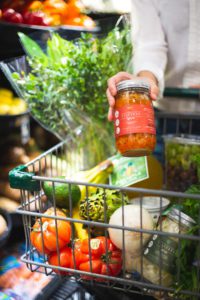 I graduated from LSU with my degree in microbiology. I had always thought I would become a physician, but when the opportunity arose to go to medical school I just knew it wasn’t for me. I wanted so deeply to stay connected to microbiology, to lab work, to microscopes and petri dishes. Jon got his degree in digital advertising, and afterward was miserable working for ad agencies. He had this passion, talent and love for photography and desired an outlet to grow in that.
I graduated from LSU with my degree in microbiology. I had always thought I would become a physician, but when the opportunity arose to go to medical school I just knew it wasn’t for me. I wanted so deeply to stay connected to microbiology, to lab work, to microscopes and petri dishes. Jon got his degree in digital advertising, and afterward was miserable working for ad agencies. He had this passion, talent and love for photography and desired an outlet to grow in that.
I began pursuing a second degree in clinical microbiology, and, at the same time, Jon and I started our passion project: a blog called Microbial Universe. He loves photography and I love the natural world of microbes, so we just wanted an outlet for our passions that we were not finding in our careers. We started posting recipes on our blog for making fermented foods at home--the right way, focusing on the microbiology of fermenting foods. One day I came home from school and said, “I think I know what we should do with our lives ... wanna start a business?” and Jon said “yep.” Long story short, now we are here.
I mean, can you name a better duo to start a fermented foods company? A microbiologist and a photographer with a degree in digital advertising. We were built to do this.
4. What are the first things customers notice about your products?
The pretty labels. And that was the goal.
5. What sets your company apart?
We keep our customers engaged with us by running our own social media accounts consistently with a beautiful aesthetic. We've created a product brand that easily captivates customers. Along with that, we are a microbiologist-owned company. All of our products are made with probiotic microbes as the focus. All food products are tested using microbiological techniques to identify the quantity and species of probiotic bacteria present in our products.
Basically, we are able to get people's attention with beautiful images, branding and transparency of our business. Then, we are able to keep them around with facts, science and genuine content.
6. What is one thing you think customers should know about your products that they may not be aware of?
First things first: our products are not pickled. Fermentation and pickling are two completely different processes. What we do is called "wild fermentation." The only ingredients in our products are fresh vegetables, organic spices, salt and water. Microbes from nature (the microbes naturally present on the produce) do all of the fermentation and preserving. We never use starter cultures; the probiotic bacteria in our products come only from the fresh produce. Unlike pickling, it results in a food that is naturally preserved and also probiotic.
7. How do you keep your inventory fresh and up to date?
We are currently developing some new flavors of ferments that we will be able to produce once we move into our new larger commercial kitchen later this year.
8. Can you share a hint about anything new customers might see at Cultured Guru in the near future?
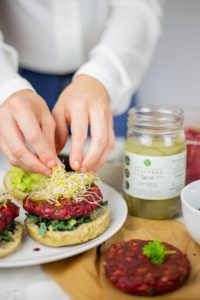 There might be three new products in the foreseeable future. One is spicy, one is the color purple, and one has a long list of extra health benefits.
There might be three new products in the foreseeable future. One is spicy, one is the color purple, and one has a long list of extra health benefits.
We had a meeting with a large, awesome, healthy store that rhymes with “bowl moods” and the idea of offering ferments made from seasonal Louisiana produce was discussed. We are excited for the possibility of stocking our current products and these new seasonal ferments with them in the near future.
9. What are a few must-have items and where can we get them?
All three of our products (fermented sauerkraut, pickles and kimchi) are must-have items. You can currently find our products in Baton Rouge at both Magpie locations, Iverstine Farms Butcher, Red Stick Spice Co., both Our Daily Bread locations, Southside Produce Co., Red Stick Pharmacy, Alexander's Highland Market, and Mint Health. Visit our site for more stores across the state (and in Texas too!) that sell our products.
10. What is your best-selling product?
Hands down: kimchi. We think people respond strongly to the kimchi because in the South, everyone loves a good kick of spice! Contrary to what many people think, kimchi is very adaptable and can be put on many things from tacos to avocado toast. Plus, our kimchi is unique in the fact that it is vegan-friendly. Many traditional kimchi recipes include some sort of fish sauce or paste. We subbed out those parts for kelp (a sea vegetable) to maintain a similar umami flavor that you would find in a traditional kimchi.
To learn more, visit cultured.guru.

